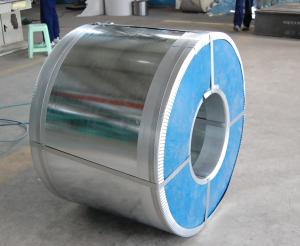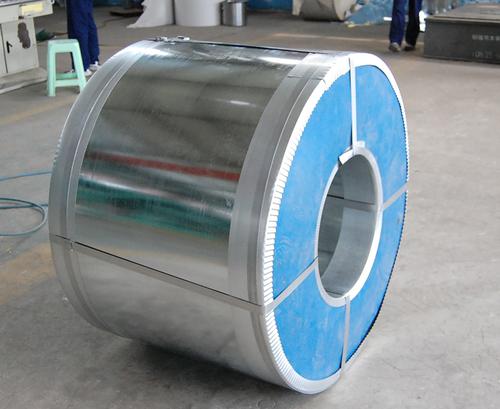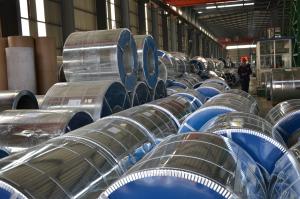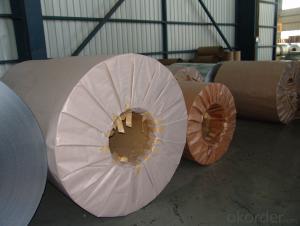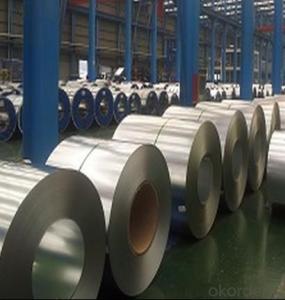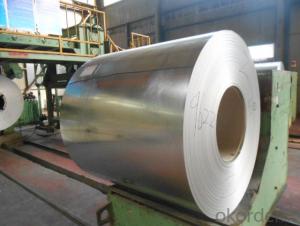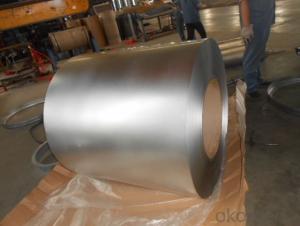Galvalume steel coil(GL,FULL HARD GL)
- Loading Port:
- TIANJIN
- Payment Terms:
- TT OR LC
- Min Order Qty:
- -
- Supply Capability:
- 30000ton m.t./month
OKorder Service Pledge
OKorder Financial Service
You Might Also Like
We specialize in manufacturing galvanized steel coil, galvalume steel coil, prepainted steel coil and galvanized corrugated sheets.
Nowadays our company has grown up to a collectivized company . We are grateful to the cooperation partner who`s grown with us all the way. We hope we could make more friends from all over the world. Under the joint efforts of both sides we believe that we will continue to achieve win-win results based on mutual trust and mutual support.
High Quality Galfan (5% Al-Zn) Galvalume (55% Al-Zn) GL, GF Coil and sheet
1.Thickness:0.16-0.45mm
2.Width:750-925
High Quality Galfan (5% Al-Zn) Galvalume (55% Al-Zn) GL, GF Coil and sheet
corrosion of industrial and civil building roof,roof grille. In light industries it can be usd as appliances shell, civil chimney,kitchenware, etc Farming fisheries mainly used as food storage, the seafoodfrozen processing equipment of meat, Business mainly used as materials ofstorage, packing equipment etc
Chemical composition
| C(%) | Mn(%) | Si(%) | S(%) | P(%) |
Q195 | 0.06-0.12 | 0.25-0.50 | ≤0.30 | ≤0.050 | ≤0.045 |
Q235 A | 0.14-0.22 | 0.30-0.65 | ≤0.30 | ≤0.050 | ≤0.045 |
B | 0.12-0.20 | 0.30-0.67 | ≤0.30 | ≤0.045 | ≤0.045 |
C | ≤0.18 | 0.35-0.80 | ≤0.30 | ≤0.040 | ≤0.040 |
D | ≤0.17 | 0.35-0.80 | ≤0.30 | ≤0.035 | ≤0.035 |
Q345 | 0.12-0.20 | 1.20-1.60 | 0.20-0.60 | ≤0.030 | ≤0.030 |
SPCC | ≤0.10 | ≤0.50 | ≤0.05 | ≤0.025 | ≤0.035 |
Physical properties
| Yield point | Tensile | Elogation |
Q195 |
| 375-430 | ≥32 |
Q235 A | ≥235 | 375-460 | ≥26 |
B | ≥235 | 375-460 | ≥26 |
C | ≥185 | 375-460 | ≥21 |
D | ≥185 | 375-4605 | ≥21 |
Q345 | 490-670 | 320 | ≥21 |
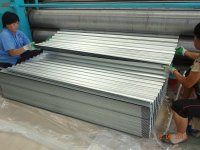
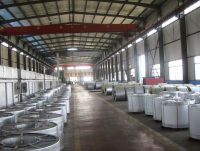
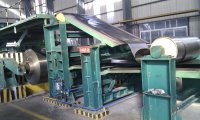
- Q: in a lab at school we did heat treatment of steelwhat are the possible phases present in the steel sample in as-received, as-quenched and as-tempered conditions? specifically when is it ferrite, austenite and pearliteis the steel originally in the ferrite phase? then when headed turns into austenite and when quenched martensite is formed and when tempered cermentite is formed...........where is pearlite involved and am i correct about the ferrite?
- hey from what i learned in uni last sem, steel is originally ferrite form at first at room conditions. it will undergo poly morphic transformation to become FCC structure austenite form at 912 degree celcius. under conditions, it can become pearlite (which is a combination of ferrite and cementite) or bainitie( a finer form of pearlite). queching conditions to room temperature will form martensite which is the strongest but brittle steel form. tempered cementite is formed when we quench it and then raise temperatures before sir cooling. hope it helps, pls vote me best answer is i deserve it. thanks
- Q: What are the different types of steel alloys used in coils?
- Coils commonly employ various types of steel alloys, each possessing unique properties and characteristics. Some frequently used types include: 1. Carbon Steel: As the most fundamental and widely utilized steel alloy in coils, it boasts low carbon content and renowned strength and durability. Carbon steel coils find extensive application in areas demanding high strength, such as automotive parts, construction materials, and machinery components. 2. Stainless Steel: Comprising an iron, chromium, and other element alloy, stainless steel coils exhibit exceptional resistance to corrosion, formidable strength, and heat resistance properties. They are typically employed in scenarios where shielding against corrosion and staining is pivotal, such as kitchen appliances, medical equipment, and transportation components. 3. Galvanized Steel: Galvanized steel coils are formed by coating regular carbon steel with a layer of zinc, furnishing excellent corrosion resistance and safeguarding the underlying steel from rust. Commonly utilized in outdoor settings like roofing, fencing, and automotive body parts. 4. Alloy Steel: Alloy steel coils are manufactured by incorporating diverse alloying elements like manganese, nickel, chromium, or molybdenum into carbon steel, thereby enhancing the steel's strength, hardness, and wear resistance. These coils frequently find application in industries necessitating high strength and toughness, such as machinery, tools, and construction equipment manufacturing. 5. Electrical Steel: Electrically specialized steel coils are designed explicitly for employment in electrical equipment like transformers and electric motors. These coils possess low electrical resistance and high magnetic permeability, facilitating efficient electricity conduction and magnetic field generation. Typically constructed from a silicon alloy, which enhances electrical and magnetic properties. In conclusion, the selection of a steel alloy for coils hinges upon the specific requirements of the given application, encompassing factors like strength, corrosion resistance, electrical conductivity, and heat resistance.
- Q: i would like to know of any companies who buy shredded scrap steel
- We are one of the biggest steel mills in Asia. Under our group, we have steel mills in Thailand and Bangladesh. On the monthly basis, we purchase steel scrap HMS1/2 80:20 and the shredded ISRI210/211, ISRI211 by bulk and 20' container to Thailand and Bangladesh. Due to the limitation of our existing shredded steel scrap supplier, we need to get more supply of the shredded. Please contact us or offer us of ISRI 210/211 or ISRI211 CFR Chittagong, Bangladesh with 500mt - 2000mt per shipment by 20' container. If any questions, please feel free to contact us.
- Q: What are the different types of coil slitting machines?
- In the market, one can find various coil slitting machines, each designed to meet specific requirements and preferences. Some commonly used types are as follows: 1. Rotary shear slitters: These machines employ rotary knives mounted on a rotating drum to slice the coil into narrow strips. They are perfect for high-speed operations and can handle large quantities of material. 2. Loop slitters: Loop slitting machines pass the coil through a loop to maintain tension and prevent material damage during the slitting process. They are suitable for delicate materials or those prone to deformation. 3. Turret slitters: Turret slitting machines have multiple sets of slitting knives mounted on a rotating turret. This enables quick and easy switching between various slitting configurations, reducing downtime and increasing productivity. 4. Drag slitters: Drag slitting machines utilize a stationary knife and a moving clamp to hold and pull the coil through the cutting process. They are versatile and can handle a wide range of materials, including thick or heavy coils. 5. Crush slitters: Crush slitting machines employ a set of opposing rollers to crush and cut the coil material. They are commonly used for softer materials or those that are challenging to cut with traditional knives. 6. Laser slitters: Laser slitting machines make use of a high-powered laser beam to precisely cut through the coil material. They offer unparalleled accuracy and are suitable for high-end applications or materials with complex shapes. Each type of coil slitting machine has its own advantages and limitations. The choice of machine depends on factors such as the type of material, required speed, desired accuracy, and production volume.
- Q: Is Stainless steel called that because.....a. Its stains lessORb. Its virtually stainless (it can't stain).Lol do you know the correct answer?????
- Stainless Steel is named that because when compared to untreated steel it is virtually stainless. It is virtually stainless, and harbors very little germs and bacteria. That is why it has been the standard in the food industry for years.
- Q: I'm assuming that brass is flexible, expands and then bounces back to it's original shape. But if aluminum and steel expand and don't contract wouldn't they cause guns to jam more often for example?
- Some Blazer/CCI loaded ammo comes with aluminum casings, it is easy to tell because they have a very dull finish compared to the nickel. These cases are not safe to reload. There is also Wolf brand from Russia that has a steel casing, it looks laqured and it may or may not be able to be reloaded.
- Q: How are steel coils inspected for flatness?
- To ensure they meet the necessary standards, steel coils undergo a variety of methods and techniques to inspect their flatness. Trained inspectors visually examine the coil's surface for signs of waviness or unevenness, searching for visible defects like waves, buckles, or twists that could impact its flatness. Another approach involves using specialized equipment such as flatness gauges or profilometers to inspect the coil's flatness. These instruments measure the surface profile and provide detailed information about any deviations from the desired flatness. They can detect both local and overall flatness issues, offering a more precise assessment of the coil's quality. In addition to visual and instrumental inspections, physical tests can also be conducted to evaluate the flatness of steel coils. The "drape" test, for instance, involves draping the coil over a flat surface and measuring any noticeable gaps or unevenness. This test quickly identifies major flatness problems. Moreover, computerized analysis and simulation techniques are gaining popularity for inspecting the flatness of steel coils. These methods utilize advanced software to analyze the coil's surface data and generate comprehensive reports on its flatness characteristics. By comparing the actual surface profile with the desired specifications, these techniques provide a thorough assessment of the coil's flatness. Overall, the inspection of steel coils for flatness combines visual inspection, specialized equipment, physical tests, and advanced analysis techniques. These methods ensure that the coils meet the necessary flatness standards, which is essential for their successful application in industries such as automotive, construction, and manufacturing.
- Q: Why is it usually scorned by the shooting community to use steel cased ammo (like Wolf)? Always hear corrosive and steel is bad for the extractor/firing pin. Hulp a simpleton out!
- I okorder /
- Q: i bought an airsoft gun and it said steel recievers on it im not sure what that is
- It means that the receiver is steel or metal. The receiver is like the bottom and body part of your gun.
- Q: earlier name of jsw steel ltd. may be jindal iron steel ltd.
- JSW Steel Ltd - Profile Office Address 5 A, Jindal Mansion, Dr A G Deshmukh Marg, Mumbai Maharastra 400026 Phone 022-23513000 Business Summary JSW Steel Limited Formerly known as Jindal Vijayanagar Steel Limited. The Company's principal activity is to manufacture hot rolled steel coils in India using the revolutionary Corex technology. In addition, the Company also manufactures steel plates and sheets. It manufactures steel using oxygen based iron and steel through continuous casting and hot rolling. Executive Team Executive Name Designation Savitri Devi Jindal Sajjan Jindal Dr. B N Singh Chairperson Additional Director Vice Chairman Managing Director Joint Managing Director
Send your message to us
Galvalume steel coil(GL,FULL HARD GL)
- Loading Port:
- TIANJIN
- Payment Terms:
- TT OR LC
- Min Order Qty:
- -
- Supply Capability:
- 30000ton m.t./month
OKorder Service Pledge
OKorder Financial Service
Similar products
Hot products
Hot Searches
Related keywords
